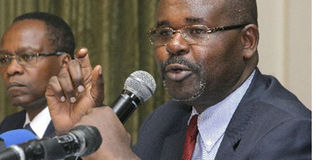Banks fight new bid to cap interest rates

Kenya Bankers Association (KBA) chief executive officer Habil Olaka addresses a press briefing at Hilton Hotel on July 28, 2016, to state the bankers' position on the regulation of interest rates. They noted the capping was against the principal of a free market, which is the guiding principle in Kenya. PHOTO | COURTESY
What you need to know:
- Parliament on Wednesday passed a Bill capping bank interest rates at four per cent above the indicative Central Bank Rate (CBR).
- If President Kenyatta immediately signs the Bill into law, bank lending rates would be capped at 14.5 per cent based on the current CBR of 10.5 per cent.
Bankers have urged the President to reject the Bill seeking to cap interest rates, arguing that it will hit small borrowers hardest.
Individual borrowers, small and medium sized enterprises that are presumed to have a higher risk of defaulting will be locked out of credit access if the Bill becomes law, the Kenya Bankers Association said Thursday.
Parliament on Wednesday passed a Bill capping bank interest rates at four per cent above the indicative Central Bank Rate (CBR), pushing the decision on whether to assent to the Bill or reject it to President Uhuru Kenyatta.
If President Kenyatta immediately signs the Bill into law, bank lending rates would be capped at 14.5 per cent based on the current CBR of 10.5 per cent.
That would be significantly lower than the current average lending rate of 18 per cent, as per Central Bank of Kenya (CBK) data.
Some borrowers are currently paying as high as 24 per cent for short to medium term loans.
High net worth individuals and large corporations have financial muscle to demand lower interest rates from the banks.
“If the interest rate is capped, then borrowers who have a higher risk profile will be pushed out from banks to unregulated lenders such as shylocks,” said association chief executive Habil Olaka.
Lenders are pleading with the President “to listen to the experts’ opinion” and ignore the cry of millions who have borne the load of high interest rates for years.
They acknowledged the interest rates were high but “there are better solutions than capping”.
The association said the bankers were willing to put billions of shillings in a fund to train small businesses on maintenance of accounting records to ease their ability to access loans.
SMEs will also get loans at discounted rates from the fund that will be managed by the bankers at the constituency level.
FAILED ATTEMPTS
The bankers said they were willing to contribute one per cent of their total loan book into the fund with each lender contributing in proportion to the size of loans issued to SMEs. Currently the industry loan book is about Sh2.2 billion.
Previous recommendations by bankers on how to address the high cost of loans have proven futile, making their argument weak.
Introduction of credit information sharing has largely seen banks blacklist defaulters, with loyal borrowers having nothing to show for it.
Licensing of innovative products such as agency and mobile banking, which have lowered the cost of doing business for banks, has also not been passed down to bank customers, with banks pocketing huge profits.
Three Kenyan banks which fall among the top 1,000 lenders in the world have consistently ranked tops on returns on capital alongside lenders in volatile economies such as Egypt and Mexico.
The bankers wrote off any chance of fighting the Bill in court if the President assented to it, saying they would abide by it immediately but warned of dire consequences.
They noted the capping was against the principal of a free market, which is the guiding principle in Kenya.
The bankers cited failed attempts in other countries to regulate interest rates saying the effects of the regulation overflowed to other spheres of the economy.
“Every country that has had a cap on interest rates has also had to control its currency,” said the chief executive of NIC Bank and the vice chairman of the bankers association, Mr John Gachora.
He cited Zambia, Nigeria and India as some of the countries that had to control their currencies due to interest rates caps.



